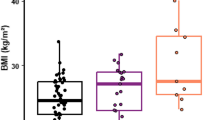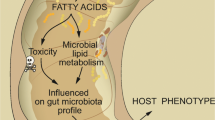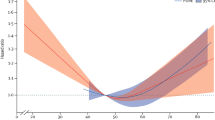Abstract
Aims
Inflammation and oxidative damage contribute significantly to the development of cardiovascular diseases (CVD). Postprandial oxidative stress and inflammation are characterized by an increased susceptibility of the organism toward oxidative damage after consumption of a meal rich in lipids and/or carbohydrates. Micronutrients modulate immune system and exert a protective action by reducing oxidized low-density lipoprotein (ox-LDL) level. The aim of the present study was to evaluate the postprandial plasma ox-LDL level and the gene expression of 13 genes related to oxidative stress (HOSp) and human inflammasome pathways (HIp), after a tocopherol-enriched Mediterranean meal (TEM), and a Western high-fat meal (HFM). Moreover, Mediterranean Adequacy Index was calculated to define the quality of both meals.
Methods
We set up a randomized and crossover trial in healthy human volunteers. Ox-LDL level was measured by enzyme-linked immunosorbent assay and the gene expression of 13 genes related to HOSp and HIp by qRT-PCR.
Results
Ox-LDL levels significantly decreased comparing HFM versus TEM (p < 0.05). Percentages of significantly overexpressed genes after each dietary treatment are as follows: (A) baseline versus HFM: 7.69 % HIp and 23.08 % HOSp; (B) baseline versus TEM: 7.69 % HIp and 7.69 % HOSp; (C) HFM versus TEM: 15.38 % HIp and 15.38 % HOSp.
Conclusions
TEM reduced postprandial risk factors of CVD, such as ox-LDL, and the expression of inflammation and oxidative stress-related genes. Chronic studies on larger population are necessary before definitive conclusions.
Trial registration
ClinicalTrials.gov Id: NCT01890070.



Similar content being viewed by others
References
Kant AK (2010) Dietary patterns: biomarkers and chronic disease risk. Appl Physiol Nutr Metab 35:199–206. doi:10.1139/H10-005
Ross R (1999) Atherosclerosis—an inflammatory disease. N Engl J Med 340(2):115–126
Libby P, Ridker PM, Maseri A (2002) Inflammation and atherosclerosis. Circulation 105:1135–1143. doi:10.1161/hc0902.104353
Li D, Mehta JL (2005) Oxidized LDL, a critical factor in atherogenesis. Cardiovasc Res 68(3):353–354
Steinberg D (2002) Atherogenesis in perspective: hypercholesterolemia and inflammation as partners in crime. Nat Med 8(11):1211–1217
Mitra S, Goyal T, Mehta JL (2011) Oxidized LDL, LOX-1 and atherosclerosis. Cardiovasc Drugs Ther 25(5):419–429. doi:10.1007/s10557-011-6341-5
Mehta JL, Sanada N, Hu CP, Chen J, Dandapat A, Sugawara F, Satoh H, Inoue K, Kawase Y, Jishage K, Suzuki H, Takeya M, Schnackenberg L, Beger R, Hermonat PL, Thomas M, Sawamura T (2007) Deletion of LOX-1 reduces atherogenesis in LDLR knockout mice fed high cholesterol diet. Circ Res 100(11):1634–1642
Le NA (2015) Lipoprotein-associated oxidative stress: a new twist to the postprandial hypothesis. Int J Mol Sci 16(1):401–419. doi:10.3390/ijms16010401
Lacroix S, Rosiers CD, Tardif JC, Nigam A (2012) The role of oxidative stress in postprandial endothelial dysfunction. Nutr Res Rev 25(2):288–301. doi:10.1017/S0954422412000182
Yusuf S, Hawken S, Ounpuu S, Dans T, Avezum A, Lanas F, McQueen M, Budaj A, Pais P, Varigos J, Lisheng L, INTERHEART Study Investigators (2004) Effect of potentially modifiable risk factors associated with myocardial infarction in 52 countries (the INTERHEART study): case–control study. Lancet 364(9438):937–952
Erikci Ertunc M, Hotamisligil GS (2016) Lipid signaling and lipotoxicity in metabolic inflammation: indications for metabolic disease pathogenesis and treatment. J Lipid Res. pii: jlr.R066514
Holt EM, Steffen LM, Moran A, Basu S, Steinberger J, Ross JA, Hong CP, Sinaiko AR (2009) Fruit and vegetable consumption and its relation to markers of inflammation and oxidative stress in adolescents. J Am Diet Assoc 109:414–421. doi:10.1016/j.jada.2008.11.036
Ishigaki Y, Oka Y, Katagiri H (2009) Circulating oxidized LDL: a biomarker and a pathogenic factor. Curr Opin Lipidol 20:363–369. doi:10.1097/MOL.0b013e32832fa58d
Calabrese V, Cornelius C, Trovato A, Cavallaro M, Mancuso C, Di Renzo L, Condorelli D, De Lorenzo A, Calabrese EJ (2010) The hormetic role of dietary antioxidants in free radical-related diseases. Curr Pharm Des 16:877–883. doi:10.2174/138161210790883615
Zamora-Ros Raul et al (2013) Dietary intakes and food sources of phenolic acids in the European Prospective Investigation into Cancer and Nutrition (EPIC) study. Br J Nutr 110:1500–1511. doi:10.1017/S0007114513000688
Fidanza F, Alberti A, Fruttini D (2005) The Nicotera diet: the reference Italian Mediterranean diet. World Rev Nutr Diet 95:115–121. doi:10.1159/000088278
De Lorenzo A, Petroni ML, De Luca PP et al (2001) Use of quality control indices in moderately hypocaloric Mediterranean diet for treatment of obesity. Diabetes Nutr Metab 14:181–188
Chrysohoou C, Panagiotakos DB, Pitsavos C et al (2004) Adherence to the Mediterranean diet attenuates inflammation and coagulation process in healthy adults: the ATTICA study. J Am Coll Cardiol 44:152–158. doi:10.1016/j.jacc.2004.03.039
Di Renzo L, Di Pierro D, Bigioni M et al (2007) Is antioxidant plasma status in humans a consequence of the antioxidant food content influence? Eur Rev Med Pharmacol Sci 11:185–192
De Lorenzo A, Noce A, Bigioni M, Calabrese V, Della Rocca DG, Di Daniele N, Tozzo C, Di Renzo L (2010) The effects of Italian Mediterranean organic diet (IMOD) on health status. Curr Pharm Des 16:814–824. doi:10.2174/138161210790883561
Alberti-Fidanza A, Fidanza F (2004) Mediterranean adequacy index of Italian diets. Public Health Nutr 7:937–941. doi:10.1079/PHN2004557
Norton K, Olds T (1996) Anthropometrica. Australia, Sydney
Di Renzo L, Rizzo M, Iacopino L, Sarlo F, Domino E, Jacoangeli F, Colica C, Sergi D, De Lorenzo A (2013) Body composition phenotype: italian mediterranean diet and C677T MTHFR gene polymorphism interaction. Eur Rev Med Pharmacol Sci 17:2555–2565
Livak KJ, Schmittgen TD (2001) Analysis of relative gene expression data using Real-Time Quantitative PCR and the 2−ΔΔCt method. Methods 25:402–408. doi:10.1006/meth.2001.1262
Rudkowska I, Paradis AM, Thifault E, Julien P, Tchernof A, Couture P, Lemieux S, Barbier O, Vohl MC (2013) Transcriptomic and metabolomic signatures of an n-3 polyunsaturated fatty acids supplementation in a normolipidemic/normocholesterolemic Caucasian population. J Nutr Biochem 24:54–61. doi:10.1016/j.jnutbio.2012.01.016
Valkon M, Leibfritz D, Moncol J, Cronin MT, Mazur M, Telser J (2007) Free radicals and antioxidants in normal physiological functions and human disease. Int J Biochem Cell Biol 39:44–84. doi:10.1016/j.biocel.2006.07.001
Kornman KS, Martha PM, Duff GW (2004) Genetic variations and inflammation: a practical nutrigenomics opportunity. Nutrition 20:44–49. doi:10.1016/j.nut.2003.09.008
Matsumoto Y, Oshida T, Obayashi I et al (2002) Identification of highly expressed genes in peripheral blood T cells from patients with atopic dermatitis. Int Arch Allergy Immunol 129:327–340. doi:10.1159/000067589
Ortega R (2006) Importance of functional foods in the Mediterranean diet. Public Health Nutr 9:1136–1140. doi:10.1017/S1368980007668530
Grosso G, Marventano S, Yang J, Micek A, Pajak A, Scalfi L, Galvano F, Kales NS (2015) A comprehensive meta-analysis on evidence of mediterranean diet and cardiovascular disease: are individual components equal? Crit Rev Food Sci Nutr. doi:10.1080/10408398.2015.1107021
Beydoun MA, Shroff MR, Chen X, Beydoun HA, Wang Y, Zonderman AB (2011) Serum antioxidant status is associated with metabolic syndrome among U.S. adults in recent national surveys. J Nutr 141:903–913. doi:10.3945/jn.110.136580
Basu A, Betts NM, Ortiz J, Simmons B, Wu M, Lyons TJ (2011) Low-energy cranberry juice decreases lipid oxidation and increases plasma antioxidant capacity in women with metabolic syndrome. Nutr Res 31:190–196. doi:10.1016/j.nutres.2011.02.003
Bouchard-Mercier A, Paradis AM, Rudkowska I, Lemieux S, Couture P, Vohl MC (2013) Associations between dietary patterns and gene expression profiles of healthy men and women: a cross-sectional study. Nutr J 12:12–24. doi:10.1186/1475-2891-12-24
Di Renzo L, Carraro A, Minella D, Botta R, Contessa C, Sartor C, Iacopino AM, De Lorenzo A (2014) Nutrient analysis critical control point (NACCP): hazelnut as a prototype of nutrigenomic study. Food Nutr Sci 5:79–88. doi:10.4236/fns.2014.51011
Casas-Agustench P, López-Uriarte P, Bulló M, Ros E, Cabré-Vila JJ, Salas-Salvadó J (2011) Effects of one serving of mixed nuts on serum lipids, insulin resistance and inflammatory markers in patients with the metabolic syndrome. Nutr Metab Cardiovasc Dis 21:126–135. doi:10.1016/j.numecd.2009.08.005
Souza RG, Gomes AC, Naves MM, Mota JF (2015) Nuts and legume seeds for cardiovascular risk reduction: scientific evidence and mechanisms of action. Nutr Rev 73:335–347. doi:10.1093/nutrit/nuu008
Maffeis C, Pinelli L, Surano MG, Fornari E, Cordioli S, Gasperotti S (2012) Pro-atherogenic postprandial profile: meal-induced changes of lipoprotein sub-fractions and inflammation markers in obese boys. Nutr Metab Cardiovasc Dis 22:959–965. doi:10.1016/j.numecd.2010.12.009
Di Renzo L, Carraro A, Valente R, Iacopino L, Colica C, De Lorenzo A (2014) Intake of red wine in different meals modulates oxidized LDL level, oxidative and inflammatory gene expression in healthy people: a randomized crossover trial. Oxid Med Cell Longev 2014:681318. doi:10.1155/2014/681318
Schrauwen P, Hoppeler H, Billeter R, Bakker AH, Pendergast DR (2010) Fiber type dependent upregulation of human skeletal muscle UCP2 and UCP3 mRNA expression by high-fat diet. Int J Obes Relat Metab Disord 25:449–456. doi:10.1038/sj.ijo.0801566
Kuo ML, Huang TS, Lin JK (1996) Curcumin, an antioxidant and anti-tumor promoter, induces apoptosis in human leukemia cells. Biochim Biophys Acta 1317:95–100. doi:10.1016/S0925-4439(96)00032-4
Smolarek AK, So JY, Burgess B, Kong AN, Reuhl K, Lin Y, Shih WJ, Li G, Lee MJ, Chen YK, Yang CS, Suh N (2012) Dietary administration of δ- and γ-tocopherol inhibits tumorigenesis in the animal model of estrogen-receptor positive, but not HER-2 breast cancer. Cancer Prev Res (Phila) 5:1310–1320. doi:10.1158/1940-6207.CAPR-12-0263
Kim SH, Park JG, Lee J, Yang WS, Park GW, Kim HG, Yi YS, Baek KS, Sung NY, Hossen MJ, Lee MN, Kim JH, Cho JY (2015) The Dietary Flavonoid Kaempferol Mediates Anti-Inflammatory Responses via the Src, Syk, IRAK1, and IRAK4 Molecular Targets. Mediat Inflamm 2015:904142. doi:10.1155/2015/904142
Zhenxing X, Shufang X, Guo-Wei L (2014) Gamma-aminobutyric acid improves oxidative stress and function of the thyroid in high-fat diet fed mice. J Funct Foods 8:76–86. doi:10.1016/j.jff.2014.03.003
Di Renzo L, Carraro A, Valente R, Iacopino L, Colica C, De Lorenzo A (2014) Intake of red wine in different meals modulates oxidized LDL level, oxidative and inflammatory gene expression in healthy people: a randomized crossover trial. Oxid Med Cell Longev 2014:681318. doi:10.1155/2014/681318
Waxman A, World Health Assembly (2004) WHO global strategy on diet, physical activity and health. Food Nutr Bull 25:292–302
Author’s contributions
ADL conceived the experiments and had primary responsibility for the final content; LDR designed the experiments and drafted the manuscript; MAP, SB, IG collected the data and performed the experiments; PG analyzed the data. AC developed the MAI calculator. All authors contributed to the interpretation of the data and revision of the manuscript, read and approved the final manuscript.
Funding
This study was supported by grants from Ministry of Agriculture, Food and Forestry (D.M.; 2017188).
Author information
Authors and Affiliations
Corresponding author
Ethics declarations
Conflict of interest
The authors declare that they have no conflict of interest.
Ethical approval
All procedures performed in studies involving human participants were in accordance with the ethical standards of the institutional and/or national research committee and with the 1964 Helsinki Declaration and its later amendments or comparable ethical standards.
Informed consent
Informed consent was obtained from all individual participants included in the study.
Additional information
Managed by Massimo Federici.
Rights and permissions
About this article
Cite this article
De Lorenzo, A., Bernardini, S., Gualtieri, P. et al. Mediterranean meal versus Western meal effects on postprandial ox-LDL, oxidative and inflammatory gene expression in healthy subjects: a randomized controlled trial for nutrigenomic approach in cardiometabolic risk. Acta Diabetol 54, 141–149 (2017). https://doi.org/10.1007/s00592-016-0917-2
Received:
Accepted:
Published:
Issue Date:
DOI: https://doi.org/10.1007/s00592-016-0917-2




